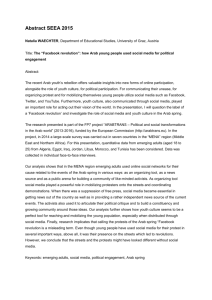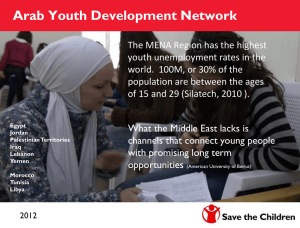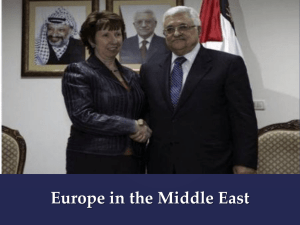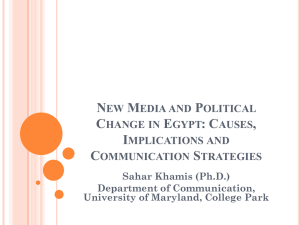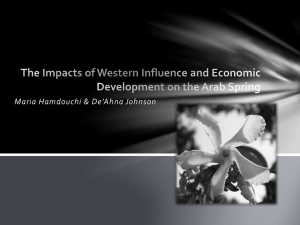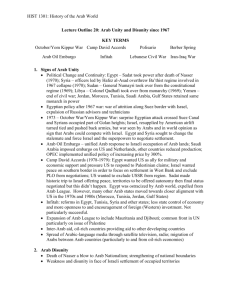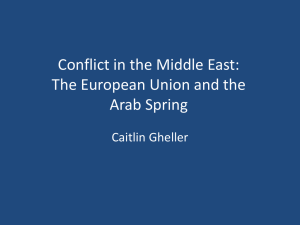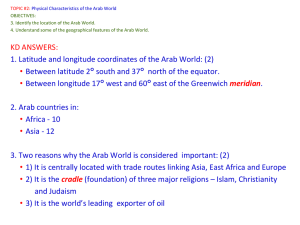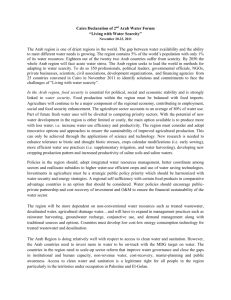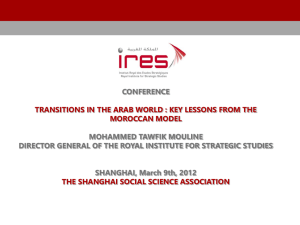Women and Decision-Making
advertisement
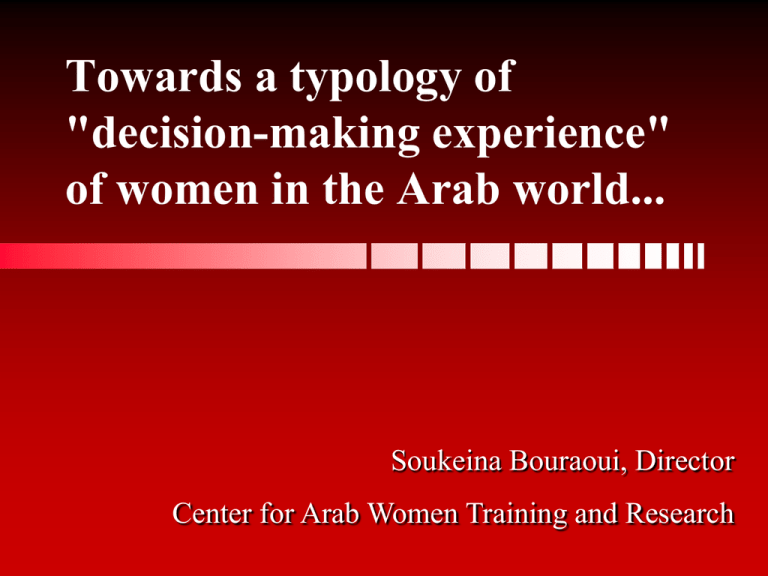
Towards a typology of "decision-making experience" of women in the Arab world... Soukeina Bouraoui, Director Center for Arab Women Training and Research • This work aims to construct a typology of decisionmaking women in the Arab world based on a qualitative survey conducted in six countries, includes three fundamental aspects: 1 - Defining the process of decision making as a "social experience"; 2 - The definition of typology analysis in the context of action research; 3 - The presentation of four configurations of decisionmaking experience in the Arab world. • But let's start with the presentation of the interest granted by the CAWTAR to the question of women's participation in decisionmaking in the Arab world: 1- Arab women and decision making as one of the strategic issues focused on by CAWTAR • Recognizing the crucial role played by Arab women in the process of sustainable development, CAWTAR has implemented an integrated project on women and decision making in the Arab world. This initiative is based on bias epistemological and heuristic, but also pragmatic and operational approach consisting of women through action. Such a multidimensional project comprises four components independent but complementary: A participatory approach, to involve different key actors from design to the implementation of the fullfledged programme. AWDR national reports Network Competition of Caricature Training manual Young researchers competition The AWDR • It is a qualitative research, covering 6 Arab countries : KSA, Egypt, Lebanon, Morocco, Sudan and Tunisia. • based on in-depth interviews and life stories 103 person (83 women, 20 men) • It helped to shed light on 3 essential elements relating to the participation of women in decision making: • the definition of decision making by the respondents, • the contexts in which decisions are made, • barriers and factors conducive to the participation of women in decision-making. 2 - Participation in decision making as a "social experiment/experience" • The process of decision making here is defined as "crystallization, more or less stable, among individuals and groups of different/ opposite logics of action, in which the actors are required to combine and prioritize in order to be noticed as subjects" . • We will attempt to outline an engendered "decisionmaking experience" in the Arab world, as the result of the articulation of 3 logics of action: • “assimilation and integration”, • “strategy and tactics” • “individuation and subjectification”. - The logic of assimilation and integration : • participation in decision making is an individual experience rooted in a social structure. • The importance, the degree and extent of a decision depend on space (public / private), institutional structures and networks (family, economic, political, administrative, etc..). • The decision also depends on the nature of its subject: • E.g: Decision making within the family, is different from a decision in a board of directors of an industrial firm; the individual internalizes the norms and values of each sphere of activity; Very often, the decision process is implemented within a complex institutional world where many social structures intersect and overlap. - The logic of tactic and strategy: • Decision refers to experiences in social relationships, based on a complex system of alliances, rivalries, tensions and negotiations, etc.. where others are perceived as rivals, allies or potential resources. • e.g: When decision is taken at family level, a woman is obliged to ally with her son to manipulate or negotiate with her husband to influence the decision. • the logic of the tactic is one that directs actions taken by actors (men and women) who are excluded from the decisions (devoid of competence, ability, legitimacy). These actors try to circumvent the system in order to influence decisions and steer the course of events according to their aspirations. - The logic of individuation and subjectification: • Individuation is a process through which the individual asserts itself as an active player involved in the manufacture of the decision. As for the logic of subjectification, it is to claim a new identity. • Several life events refer to this sense of individuation and subjectification. Participation in decision making could be the result of a bifurcation or ruptures biographical decisive marriage, widowhood, educational achievement, career advancement and mobility, etc.. considered a "social renaissance" - Building Typologies of Decision Making • Typologies are not defined as groups or juxtaposed with rigid boundaries, nor are they hierarchical; • it is a process of understanding the social reality, namely to "read" and interpret the empirical data from an abstract model built by the research team with reference to epistemological, conceptual and methodological tools. • Regarding CAWTAR’s work on women's participation in decision-making in the Arab world, it adopt a cluster analysis that is not to classify individuals or groups, but rather tries to identify the specific logic of abstract relations to ensure a better understanding of practices and situations and give a new intelligibility to social relations. 1 - under-custody Decision : • This type of DM refers to situations where men resign to women or delegate to them certain decisions concerning family matters, while demanding a say on what they deem as essential. In this type, the woman is considered a second rate actor. • A case is quoted from Saudi Arabia where women are not allowed, for example, to deal in commercial business, unless accompanied by a guardian. Thus, Lina (33, female entrepreneur) said: "I’m supported by my cousins and they are dealing with all the necessary procedures to manage my personal affairs, it is imposed by law and custom." - under-control Decision (2): • On another level, the case of Malika (34, engineer, Morocco) shows that even if the decision taken by a woman is compelling, it is respected if it is endorsed by the Director. • Where as Fatma (34, housewife, Morocco), stated that her husband decides the amount needed to support the family while she deals with the spendings. • Similarly, Khlifa (36 years, official Morocco) explained how his mother made all decisions concerning daily management of the family affairs after the death of her husband. However, critical decisions have to be consulted with her brother and brother in law. " – smart/clever decision-making: • It is based on the logic of tactics; since they are outside the scope of decision making, women resort to means adapted to various situations to influence the process of decision making. • Souad (40, female entrepreneur, married to a man aged 75) said: "I become clever, when necessary; ... I become kind and tender with my husband to change his attitude. " • As for Amina (36 years, Head of an association, Morocco), speaks of tricks her mother used to confront the authority of her husband: "My father was a polygamist and very authoritarian . My mother used several means to waive certain decisions he wanted to impose. To do this, she asked the help of family members, and even her children. " - Conditioned DM: • In this configuration, the participation of women in decision making is conditioned by the existence of a number of criteria considered as fundamental and indispensable for participation in the exercise of decision making. • According to Zaki (52, Lawyer, Egypt), women can take part in the decision provided that they are responsible. • Other conditions for the involvement of women were made by Ali (41 years, university, Egypt) who believed that women could occupy the post of Dean only if her decisions are well studied, • Mustapha (57 years, businessman, Lebanon) believes that women could occupy decision making positions, provided they consult decisions with others. - The underground decision experience: • The process of DM is not always visible. Very often, the real actors and influential in this process are not necessarily those who are formally endowed with power. As such, Neyla (43, service manager in a department, Tunisia) is responsible for developing plans and strategies targeting rural women. But in the end, her work is approved by different supervisors who take ownership for it. - The active decision : • It refers to active and effective influence in the process of decision making in which a social actor is developing a set of knowledge, know-how and means to participate fully in the exercise of power and decision-making roles to play influence in different areas of activity. • Several women from different Arab countries and acting within several sectors illustrated this decision scheme. • Raja (60, female entrepreneur, Tunisia), Houria (62 years, member of an association, Morocco), Balsam (52 years, association president and dean , Sudan) and Mahassen (45, female entrepreneur and former MP, Sudan), etc.. who have decision-making power range, powerful and influential. Conclusion • it is important to note that cluster analysis is an approach that was adopted in this work with the objective of making account the complexity of empirical reality in the various countries covered by CAWTAR’s investigation. • the different types identified does not necessarily correspond to social reality in its purest form, as it is lived and experienced by social actors. • In other words, the different characteristics of each type may be observed within the same social group, even within the same society.

